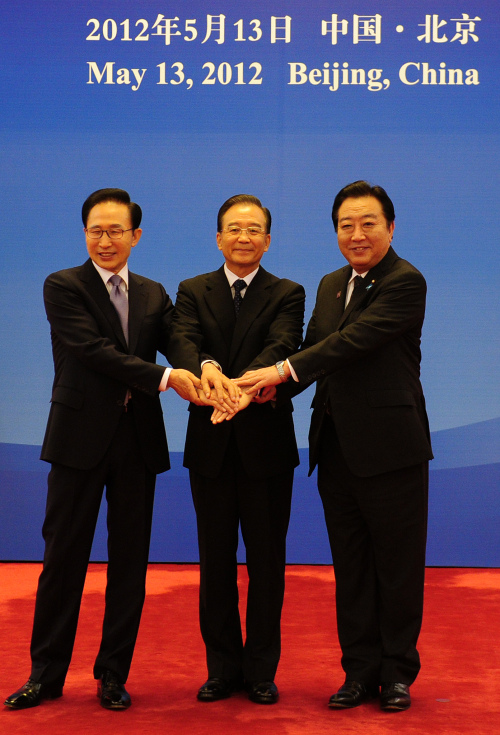BEIJING ― The leaders of South Korea, China and Japan agreed to start official negotiations on a trilateral free trade pact within this year during their annual meeting in Beijing on Sunday, stepping up efforts to deepen economic cooperation.
To this end, they agreed to begin the necessary domestic procedures and working-level consultations soon, Seoul officials said.
President Lee Myung-bak, Chinese Premier Wen Jiabao and Japanese Prime Minister Yoshihiko Noda discussed their cooperation in business, trade, security and other pending issues during the talks, the fifth of their kind.
“The start of the FTA negotiations within this year is very meaningful for the future of the three countries’ cooperation,” Lee said during a joint press conference.

President Lee Myung-bak (left), Chinese Premier Wen Jiabao (center) and Japanese Prime Minister Yoshihiko Noda pose prior to the annual trilateral summit in Beijing on Sunday. (Yonhap News)
The Chinese premier said that the decision on the FTA talks is a “crucial and strategic one” while Noda called it a “big outcome” of the summit meeting.
The envisioned pact would create one of the world’s largest economic blocs, comparable to the EU and the North American Free Trade Agreement.
The three countries’ combined population amounts to some 1.5 billion, less than a fifth of the world’s total. Their gross domestic product amounts to $12 trillion, some 20 percent of the world’s total.
Earlier this month, Seoul and Beijing declared their beginning of bilateral FTA negotiations.
During the summit, the three countries also signed an agreement aimed at setting legal, institutional grounds to protect their investors operating in each other’s territories.
The first economic deal between the three Asian powers features a fair treatment of foreign investors, strengthened protection of intellectual property and a ban on toughening investment-related regulations.
The deal goes into effect a month after the three countries notify one another that they have completed their domestic procedures including securing parliamentary approval.
North Korea topped the security agenda at the summit as concerns continue that it could soon carry out its third nuclear test.
Lee said that time has come to devise a “new, effective” measure to deter North Korea’s provocations, stressing that the three nations should work closely together to address security issues involving the reclusive state.
The Chinese premier stressed the importance of preventing tension on the Korean Peninsula.
“We should throw away the Cold War-era way of thinking and address issues through dialogue. The urgent priority is to prevent tension on the Korea Peninsula,” he said.
“We should have patience and good will. It is important to go back to the right track of dialogue and negotiations.”
Speculation has abounded that Pyongyang could conduct another underground nuclear test to make up for last month’s botched rocket launch and increase its bargaining power with the U.S.
The international community including China has remained united to dissuade the North from any action that hampers stability and peace in the region and beyond.
Last week, the five permanent U.N. Security Council members ― the U.S., Britain, China, Russia and France ― issued a joint statement urging Pyongyang to “refrain from further actions that may cause grave security concerns in the region, including any nuclear tests.”
Above all, China’s position is critical in reining in its wayward ally Pyongyang, analysts said. Beijing has recently sent warnings to its impoverished ally against another nuclear test, since uncertainty with the untested, inexperienced leader Kim Jong-un still lingers.
A set of agreements reached during the summit were announced in the “Joint Declaration on the Enhancement of Trilateral Comprehensive Cooperative Partnership” at the close of the trilateral meeting.
The three countries also adopted two annexes to the declaration.
One carries the joint statement on agricultural cooperation that calls for deepened cooperation to deal with such issues as food security, biodiversity, natural disasters and infectious illnesses among plants and animals.
The other is the joint statement on cooperation on sustainable forest management, combating desertification and wildlife conservation. It calls for more active trilateral engagement in tackling regional and global environmental issues.
The trilateral summit has been held annually since 2008 when its inaugural meeting took place in Fukuoka, Japan. The second one was held in Beijing while the third and fourth were held on Jeju Island, South Korea, and in Tokyo, Japan, respectively.
For the annual summit, the countries established a secretariat in Seoul last September.
At the South Korea-Japan-China Business Summit held after the leaders’ annual talks, Lee said that the trilateral FTA will contribute to prosperity in Northeast Asia and the resolution of the economic crisis facing the world.
“To overcome today’s economic crisis, I believe expanding free trade and international cooperation are important,” he said during his keynote speech at the Business Summit.
“Korea signed free trade deals with 45 nations including the U.S. and the EU, and has become a free trade hub that links the world’s market, and accounts for 61 percent of the world’s gross domestic product.”
Later in the day, Lee and the Chinese premier held bilateral talks where they agreed to expand security and military cooperation, and improve collaboration in future growth engines such as energy and green growth.
They also agreed to deepen their friendship through cultural and people-to-people exchanges as the two countries mark the 20th anniversary of their diplomatic ties.
By Song Sang-ho, Korea Herald correspondent
(sshluck@heraldcorp.com)





![[Weekender] How DDP emerged as an icon of Seoul](http://res.heraldm.com/phpwas/restmb_idxmake.php?idx=645&simg=/content/image/2024/04/25/20240425050915_0.jpg&u=)
